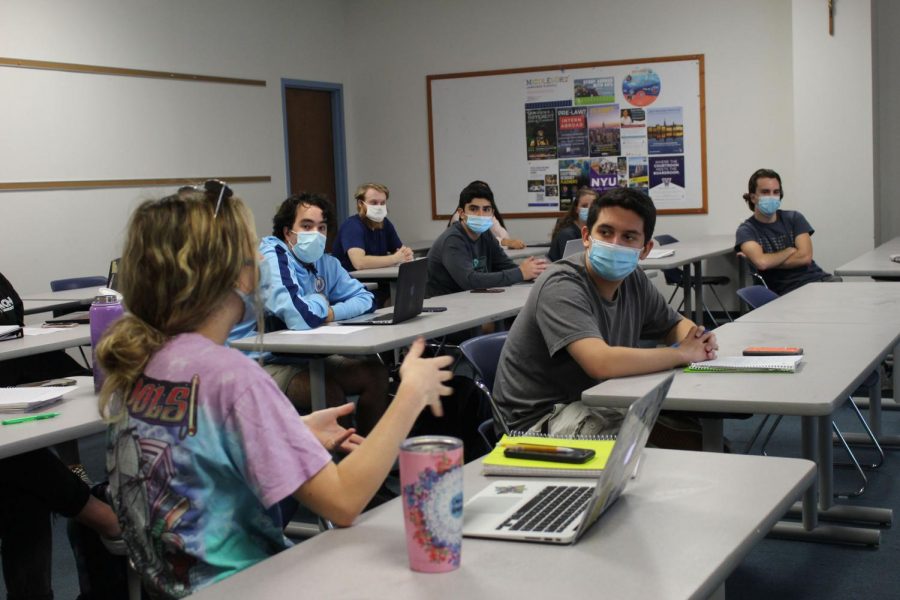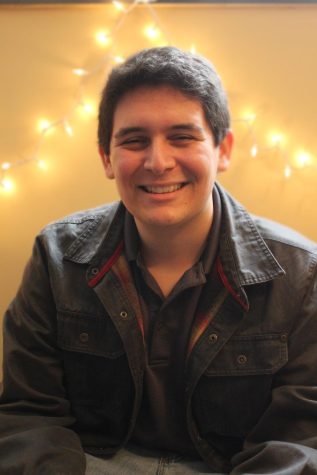Professors guide election discussions
October 27, 2020
Professors at Gannon University are preparing for the upcoming 2020 election, which will be held in six days.
Tuesday’s election, which will determine the next U.S. president as well as the winners in multiple other races, has been shadowed in divisive rhetoric, rising tensions and general concern for how the marquee presidential race will conclude.
However, in his Road to the White House class, which covers the history of U.S. presidential campaigns and elections, Jeff Bloodworth said that students have not shied away from discussing contemporary issues.
“Students seem pretty eager to learn and discuss this election,” Bloodworth said. “It is a very consequential race; in addition, the president ensures that there is always something colorful to discuss.”
Bloodworth said that as a professor, he has an obligation to ensure that the history he teaches is presented with as much objectivity as possible and allows for context in understanding the issues of the time.
“Liberal bias in the humanities and in the field of political history is not the mad raving of right-wing radio; it exists,” said Bloodworth, a history professor who serves as co-director Gannon’s School of Public Service & Global Affairs. “I try to teach about the conservative and liberal ideas and historical actors from the past with a healthy dose of respect.”
“My job is not to convince students to think like me. What a boring world that would be anyway.”
Bloodworth, who holds his doctorate in history, further said that it is his job to help students develop the critical intellectual and academic skills needed to understand the past.
“We should have classrooms in which liberals and conservatives can argue in a civil manner and discover their own biases,” Bloodworth said.
Similarly, in Andrew Caswell’s Political Psychology class, Caswell said that a theme he has seen is that some students don’t feel comfortable having political discussions in class.
“In conversations with students and employees, I’ve learned that many conservative students do not feel comfortable expressing their political beliefs,” said Caswell, who holds a doctorate in social psychology and is an assistant professor in psychology at Gannon.
“I don’t want my classroom to be yet another space where conservative students self-censor while their liberal peers are speaking freely.”
With that said, Caswell said that it has been easy to not discuss the election.
“I don’t have a rule against bringing the election into the classroom, only that we treat one another with respect,” Caswell said.
When it comes to Anjali Sahay’s two sections of Introduction to U.S. Government & Politics, the discussions have been robust.
“We have had good discussions where we focused on election news, trends and post-debate discussions,” said Sahay, an associate professor and director of the political science program. “Students have been respectful of each other’s opinions.”
The class focuses on elections and campaigns, political parties, Congress, the presidency and the judiciary, said Sahay, whose doctorate is in international studies.
To facilitate discussion, Sahay said she has tried several things, including presenting news from nonpartisan sources, having discussions on the importance of debate and the role of partisanship and having students reflect on current issues.
All three professors shared their opinions on what students should take away from the 2020 election.
Bloodworth said he hopes students are able to put the 2020 election into historical perspective.
“Learning about the political past and historical actors who have ideologies different from our own can help us develop respect for those we disagree with in current times,” Bloodworth said.
Caswell said that it’s important to view each other as humans and not allow personal disagreements to take control.
“Human behavior is multiply determined; in a political context, our votes, our actions and our beliefs are influenced by a variety of sources,” Caswell said. “Just as you see yourself a complex individual, so you should also see others, especially if they disagree with you.”
Sahay said for her, students should take away the importance of voting.
“I am a first-time voter in the presidential elections,” Sahay said. “I keep reminding the class about the most important electoral activity — the importance of filling out the census.”
MICHAEL GUIDO






